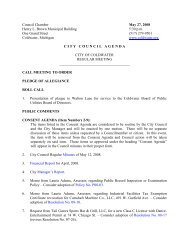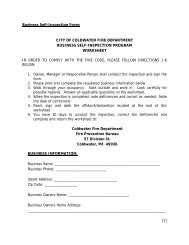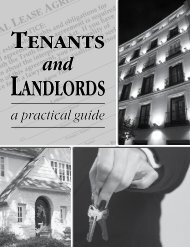Landlord Tenant Guide - State of Michigan
Landlord Tenant Guide - State of Michigan
Landlord Tenant Guide - State of Michigan
- No tags were found...
Create successful ePaper yourself
Turn your PDF publications into a flip-book with our unique Google optimized e-Paper software.
e parked in the driveway.” Some specialprovisions to be aware <strong>of</strong> include:■ Smoking: A landlord is free to prohibitsmoking in the rental property, as this wouldnot violate any state, federal, or local laws.■ Pet Restrictions: A landlord may prohibitall pets in a rental unit. A landlord may chargea fee for having a pet. An exception here isthat a landlord may not prohibit a disabledindividual relying on a service animal fromhousing the animal. Fixed-term tenancy: This type <strong>of</strong> tenancyis created when the lease agreement specifieswhen the tenancy begins and when it ends.It terminates automatically at the end <strong>of</strong>the period specified. A fixed-term lease endson its own without further action. However,many leases include the provision that thelease converts to a month-to-month tenancyat the end <strong>of</strong> the fixed term. Other leasesstate a sky-high increase in rent—sometimesdouble—if the tenant stays beyond the fixedterm.Periodic tenancy OR tenancy at will:This type <strong>of</strong> tenancy is indefinite in duration. Itis created by actual or implied consent.Usually a month-to-month tenancy, the lease isconsidered renewed at the end <strong>of</strong> each rentalperiod (month-to-month or week-to-week,depending on how <strong>of</strong>ten rent must be paid).Termination procedure is governed by statuteand requires notice.Additionally, there are special terminationrights for senior citizens or persons incapable<strong>of</strong> independent living.NOTICE:<strong>Michigan</strong> law establishes rights and obligations forParties to rental agreements. This agreement is requiredto comply with the Truth in Renting Act. If you havea question about the interpretation or legality <strong>of</strong>a provision <strong>of</strong> this agreement, you may want to seekassistance from a lawyer or other qualified person. Lease agreements entered into, renewed, orrenegotiated after June 15, 1995, must providespecial termination rights for senior citizensand persons incapable <strong>of</strong> independent living.These leases must allow the tenant who hasalready occupied a rental unit for more than13 months to terminate the lease with 60 days’written notice if either <strong>of</strong> the following occurs:1. <strong>Tenant</strong> becomes eligible to move into arental unit in senior-citizen housingsubsidized by a federal, state, or localgovernment program, OR2. <strong>Tenant</strong> becomes incapable <strong>of</strong> livingindependently, as certified by a physician ina notarized statement. If more than one person signs the lease asa tenant, the lease may state that theirobligations are “joint and several.” This meansthat each person is responsible not only forhis or her individual obligations, but also forthe obligations <strong>of</strong> all other tenants. Thisincludes paying rent and performing all otherterms <strong>of</strong> the lease. Generally, the landlord may not alter alease provision after the lease begins withoutthe tenant’s written consent. There are, <strong>of</strong>course, exceptions to this. With 30 days’written notice, the landlord may make thefollowing types <strong>of</strong> adjustments, as long asthere is a clause in the lease allowing for theadjustments:■ changes required by federal, state, orlocal law, rule, or regulation;■ changes in rules relating to the propertymeant to protect health, safety, andpeaceful enjoyment; and■ changes in the amount <strong>of</strong> rentalpayments to cover additional costsincurred by the landlord because <strong>of</strong>increases in property taxes, increases inutilities, and increases in propertyinsurance premiums.





